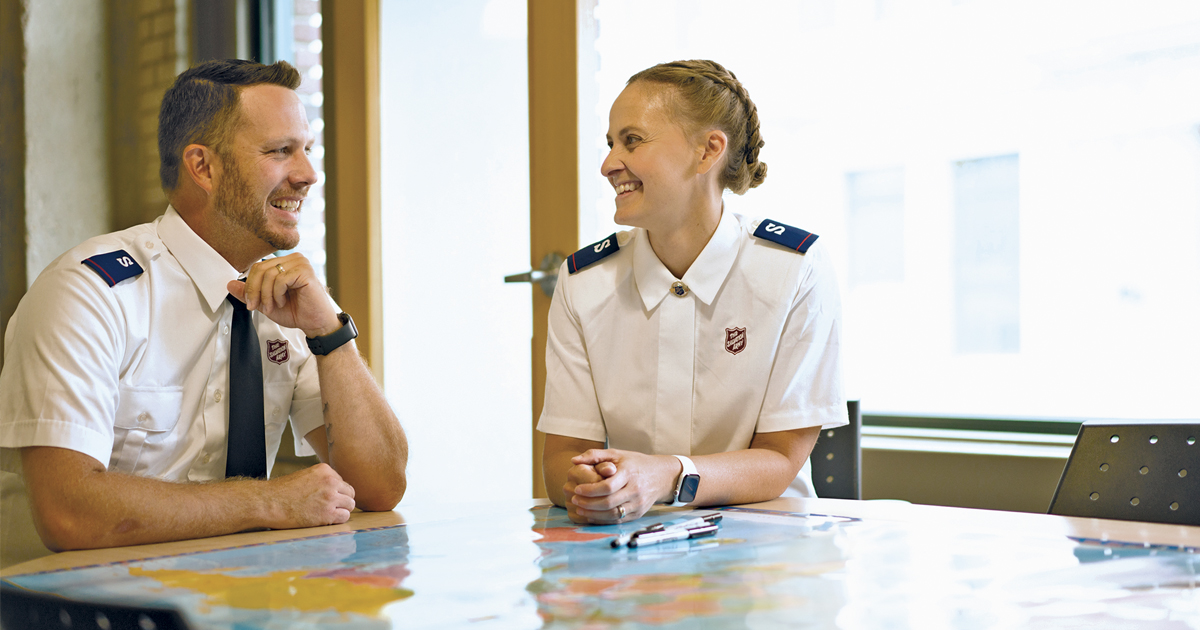This summer, our territory’s College for Officer Training (CFOT) will welcome the first session of cadets into its new eight-year training program. This training program covers the formative and ministerial development over one year as a candidate, two years as a cadet and five years as a commissioned lieutenant.
The decision to move to a new model of training is one that was made with considerable thought and reflection. In March 2020, a CFOT report called “Officer Training: A Strategy for the Future” was published, outlining many of the challenges of the traditional residential model. At the same time, there had been an increasing awareness that the role of the Salvation Army officer has taken on many complex and specialized characteristics, some of which were unimaginable a decade or two ago. In addition, changing candidate and cadet demographics—an increased number of second- or late-career cadets—mean new recruits aren’t always suited to the traditional residential training program. Feedback from the field has highlighted that recently commissioned officers have felt unprepared for the realities of ministry after leaving CFOT. Though they learned many important and valuable things in the classroom, the experience of being an officer was very different.
In 2021, a working group made up of officers from various ministry backgrounds across the territory was assembled to consider these changing demographics and develop a new, flexible training program that uses field-based, experiential learning to ensure that lieutenants are well prepared for ministry upon commissioning. In placing a greater emphasis on experiential learning, CFOT will give cadets opportunities to apply what they learn to real-life ministry situations under the supervision of an experienced corps officer or ministry unit leader, as well as an authentic experience of the life of a Salvation Army officer in training to ensure their readiness for ministry.
Rather than adding more to the already robust two-year training program, elements have been reprioritized with a mind to mission readiness. Cadets will live close to and work in corps for several days a week, under the mentorship of an experienced corps officer or ministry unit leader, and be on campus at CFOT, which is now located on the fourth floor of territorial headquarters (THQ), the other days. Sabbath rest is also factored into the cadet schedule, ensuring a healthy rhythm of life is established early on in their formation.
Cadets will also be introduced to a wide variety of Salvation Army ministries and worship expressions across the territory. While the number of courses cadets take during the two years of training has been reduced, courses will be spread over five years after commissioning, as CFOT now assumes the responsibility of overseeing and supporting the development of lieutenants. The delivery of this curriculum will be done in collaboration with divisions, Booth University College, THQ departments and other external organizations.
By commencing in the summer, the CFOT training program shifts from a 22-month program to a 24-month program. Whether cadets are relocating to the Greater Toronto Area (GTA), as on-campus or field-focused cadets, or not, as cadets in appointment and auxiliarycaptains, training will begin in July. This aligns better with the territorial annual officer move calendar and will permit CFOT time to identify appropriate field-training officers and corps in the GTA, and find appropriate housing for on-campus and field-focused cadets. Families will be able to move in, meet their new corps family and orient themselves to their new neighbourhood.
The July start will also allow time to identify appropriate appointments in the territory for those with advanced standing who are accepted as a cadet in appointment or auxiliary-captains, in which training takes place while leading a ministry unit.
Regardless of advanced academic standing and years of experience in ministry, all pathways of training require engagement with the spiritual formation program. Spiritual maturity and character development are of the utmost importance in the training and development of Salvation Army officers. Orders and regulations for the training and development of Salvation Army officers consistently place spiritual formation as the priority of training. We often cite the phrase “knowing, being, doing” to describe the training program objectives, but it is more accurate to say “being is first among knowing and doing.” Being shapes knowing and doing.
These changes to the training model, along with an emphasis on applied, fieldbased education, will give newly commissioned Salvation Army officers a solid foundation for the various aspects of Salvation Army ministries and prepare them for the realities of mission and ministry in the 21st century.
Look for more details about the changes happening at CFOT in our September/October issue.
Dr. Michael W. Boyce is the director of program implementation at the College for Officer Training.
This story is from:








New eight year model is relevant to the territory, ‘being shapes knowing and doing’ God bless the territory.